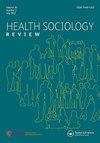Reproductive health and Bolivian migration in restrictive contexts of access to the health system in Córdoba, Argentina
IF 2.5
2区 医学
Q2 HEALTH POLICY & SERVICES
引用次数: 8
Abstract
ABSTRACT Although issues of health have been thoroughly analysed in the field of migration studies, there are still very few studies that seek to understand the reproductive health of women in migratory processes. This article analyses the reproductive health of Bolivian migrant women living in the city of Córdoba, Argentina, through an analysis focused on the community assets that migrants deploy in the health-disease-care process within restrictive contexts of access to the health system. The research consisted of an exploratory study using in-depth interviews with Bolivian migrant women and health professionals through the implementation of semi-structured guidelines. The work shows that, in an environment characterised by a health system that acts to exclude, migrant women develop a series of rational strategies where they draw on community assets embodied in forms of self-care of the body and in community networks. Based on a process of reframing memories related to health practices in the Andean world, these women incorporate these assets and more easily confront the obstacles that they must overcome as migrants in different stages of their reproductive health.在阿根廷Córdoba获得卫生系统的限制性背景下的生殖健康和玻利维亚移民
虽然健康问题已经在移民研究领域进行了彻底的分析,但仍然很少有研究试图了解妇女在移民过程中的生殖健康。本文分析了生活在阿根廷Córdoba市的玻利维亚移民妇女的生殖健康,通过对移民在获得卫生系统的限制性背景下在卫生保健过程中部署的社区资产的分析。该研究包括一项探索性研究,通过实施半结构化准则对玻利维亚移徙妇女和保健专业人员进行深入访谈。这项工作表明,在一个以排斥为特征的卫生系统环境中,移民妇女制定了一系列理性策略,在这些策略中,她们利用体现在身体自我保健形式和社区网络中的社区资产。根据对安第斯世界的保健做法进行记忆重组的过程,这些妇女吸收了这些优点,更容易面对她们作为移徙者在生殖健康的不同阶段必须克服的障碍。
本文章由计算机程序翻译,如有差异,请以英文原文为准。
求助全文
约1分钟内获得全文
求助全文
来源期刊

Health Sociology Review
Multiple-
CiteScore
7.50
自引率
0.00%
发文量
14
期刊介绍:
An international, scholarly peer-reviewed journal, Health Sociology Review explores the contribution of sociology and sociological research methods to understanding health and illness; to health policy, promotion and practice; and to equity, social justice, social policy and social work. Health Sociology Review is published in association with The Australian Sociological Association (TASA) under the editorship of Eileen Willis. Health Sociology Review publishes original theoretical and research articles, literature reviews, special issues, symposia, commentaries and book reviews.
 求助内容:
求助内容: 应助结果提醒方式:
应助结果提醒方式:


